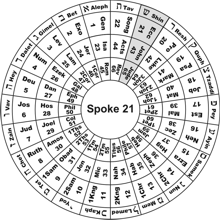
Spoke 21
Ecclesiastes, John,
Jude
|
 |
|
Jude, the servant of Jesus Christ, and brother of James, to them that are sanctified by God the Father,
and preserved (kept) in Jesus Christ, and called: Mercy unto you, and peace, and love, be multiplied.
Beloved, when I gave all diligence to write unto you of the common salvation, it was needful for me to write
unto you, and exhort you that ye should earnestly contend for the faith which was once delivered unto the saints.
Jude 1f (Spoke 21, Cycle 3)
|
If ever there were a Book of the Bible that displayed the Divine Integration of its meaning with that of its corresponding Hebrew Letter,
it is the little Book of Jude. Its defining theme is wrapped up in the
One would think perhaps that the light could get no brighter, but in truth there
is no limit to the glory God has revealed in His Holy Bible. The great theme of the John's Gospel,
based on the Shin KeyWord shamar, is also the defining theme of the little Book of Jude!
Furthermore, its opening verse links directly to the Shin verse of AV Psalm 145:
The LORD preserveth all them that love him, but all the wicked he will destroy. AV Ps 145:20
Corresponding words
meaning "to keep"
Hebrew rm'v; shamar
Greek threvw tereo
fulavssw phulasso
There are two Greek words corresponding to shamar, and both are used in Jude and in Christ's High Priestly prayer in John. Kenneth Wuest commented on the use of tereo in Jude 1 as a fulfillment of Christ's prayer:
"Preserved" is tereo, "to guard, to hold firmly, to watch or keep," it expresses watchful care, and is suggestive of present possession. Here again Jude uses the present participle. The saints have been kept guarded by God the Father with the present, and here, permanent result that they are the objects of His permanent, watchful care. Our Lord prayed (John 17:11), "Holy father, keep (tereo, same word) through thine own name those whom thou has given Me, that they may be one as we are." Our Lord committed the saints into the watchful care of God the Father, and He is keeping them for Jesus Christ, not in the sense that the Father is keeping the saints in lieu of His Son keeping them, but in the sense that the Father is keeping them so that they might continue to be forever the possession of the Lord Jesus.
We are witnessing here the geometric revelation of God the Father answering the prayer of His Son, our Lord Jesus! If ever there were a promise we could trust, this is it. Christ Himself prayed for us that His Father would keep us for Him and in Him, and here we see the Fa-ther's answer! Praise His name now and forever! Glory to God in the highest!
We also have a KeyLink from Christ's prayer to another verse in Jude. After admonishing us to keep ourselves in the love of God, Jude concludes his little Book with a prayer "unto Him that is able to keep you from falling ... the only wise God our Saviour":
Spoke 21 KeyLink:
Prayers of Jesus and Jude that we be Kept by God
John (Spoke 21, Cycle 2)
Jude (Spoke 21, Cycle 3)
[17:11] Holy Father, keep (tereo) through thine own name those whom thou hast given me, that they may be one, as we are. While I was with them in the world, I kept (tereo) them in thy name: those that thou gavest me I have kept (phulasso) ... I pray not that thou shouldest take them out of the world, but that thou shouldest keep (tereo) them from the evil. [24] Keep (tereo) yourselves in the love of God, looking for the mercy of our Lord Je-sus Christ unto eternal life. ... Now unto him that is able to keep (phulasso) you from falling, and to present you faultless before the presence of his glory with exceeding joy, To the only wise God our Saviour, be glory and majesty, dominion and power, both now and ever. Amen.
This theme runs through Jude from beginning to end. The words tereo and phulasso appear six times in the twenty-five verses of his little Book, which is about one instance for every four verses! What confidence we can have that God our Father truly will keep us! Yet this is but the beginning of wonders. The whole theme of the Book of Jude was spoken from the mouth of the Lord Jesus Himself in answer to a question asked by the Apostle Jude!
|

